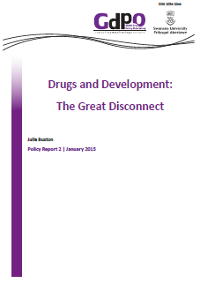Drugs and development: The great disconnect
January 2015
 This report argues that ‘drugs’ are a development issue and must be recognised as such by development agencies. The cultivation of opium poppy, coca leaf and cannabis for anything other than medical and scientific purposes is prohibited under the UN 1961 Single Convention on Narcotic Drugs, as amended by the 1972 Protocol. However conditions of marginalisation and exclusion have sustained the cultivation of these low capital input/high yield drug crops. Poverty, insecurity and inequality also exacerbate the vulnerability of ‘bridge’ states to trafficking activities. These factors are development concerns requiring economic and political solutions.
This report argues that ‘drugs’ are a development issue and must be recognised as such by development agencies. The cultivation of opium poppy, coca leaf and cannabis for anything other than medical and scientific purposes is prohibited under the UN 1961 Single Convention on Narcotic Drugs, as amended by the 1972 Protocol. However conditions of marginalisation and exclusion have sustained the cultivation of these low capital input/high yield drug crops. Poverty, insecurity and inequality also exacerbate the vulnerability of ‘bridge’ states to trafficking activities. These factors are development concerns requiring economic and political solutions.
![]() Download the brief (PDF)
Download the brief (PDF)
Yet ‘drugs’ continue to be conceptualised primarily as a crime and security issue, institutionalised in the agency of the United Nations Office on Drugs and Crime (UNODC). The resulting law enforcement response sees drugs as a cause, rather than symptom of the structural problems that make countries susceptible to penetration by the transnational trade.
This approach has particularly detrimental impacts on development prospects in the Global South due to the enduring ‘source focus’ of drug control. Despite calls for a ‘balanced approach’ to illicit drug demand and supply this still emphasises eradication and interdiction activities in ‘producer’ and ‘transit’ states, imposing disproportionate costs on developing countries that are front line states of the international drug ‘war’. The financing of law enforcement is to the detriment of social and capital spending, while militarised interdiction strategies exacerbate conditions of impunity, insecurity, corruption and rights abuses. The resulting environment is inimical to the achievement of development objectives, good governance and human security.
In recent years, the UNODC has recognised the ‘vicious cycle’ of drug production, drug trafficking, poverty and instability2 in particular through the promotion of Alternative Development (AD) for the estimated 4 million men, women and children reliant on drug crop cultivation for their livelihoods. UN Secretary General Ban Ki Moon and UNODC Executive Director Yury Fedotov have urged closer collaboration between drug control and development agencies in the elaboration of the post-2015 international development agenda and ahead of the 2016 UN General Assembly Special Session on the World Drug Problem (UNGASS).
It is argued here that efforts to deepen the engagement of the UNODC in development initiatives should be discouraged. AD is a contested proposition that is unworkable within the broader framework of the criminalisation of the drug trade and ongoing reliance on militarised enforcement. Shorn of development indicators, absent explicit harm reduction and human rights principles, and without requisite expertise and reform of UNODC bodies, AD programmes are inchoate, fragmented and risk doing more harm than good. They are an old ‘solution’ to drug supply, having been implemented for over thirty years without evidence of tangible success or uptake of lessons learned.
Key Points
• The 2016 United Nations General Assembly Special Session on the World Drug Problem (UNGASS) will see a strong lobby in support of development oriented responses to the problem of drug supply, including from the United Nations Office on Drugs and Crime (UNODC).
• The promotion of Alternative Development (AD) programmes that provide legal, non-drug related economic opportunities for drug crop cultivators reflects the limited success of enforcement responses, greater awareness of the development dimensions of cultivation activities and the importance of drugs and development agencies working co-operatively in drug environments.
• Evidence from thirty years of AD programming demonstrates limited success in supply reduction and that poorly monitored and weakly evaluated programmes cause more harm than good; there has been little uptake of best practice approaches, cultivators rarely benefit from AD programmes, the concept of AD is contested and there is no shared understanding of ‘development’.
• AD was popularised in the 1990s when development discourse emphasised participatory approaches and human wellbeing. This is distinct from the development approaches of the 2000s, which have been ‘securitised’ in the aftermath of the Global War on Terror and which re-legitimise military participation in AD.
• UNGASS 2016 provides an opportunity for critical scrutiny of AD and the constraints imposed by the 1961 Single Convention on Narcotic Drugs on innovative, rights based and nationally owned supply responses. Cultivation is a development not a crime and security issue. Consideration must be given to a reconfiguration of institutional mandates, with supply and cultivation control removed from the UNODC and brought into the remit of development agencies.
• Deliberation around the post 2015 Sustainable Development Goals provides an entry point for new approaches to drug issues in the Global South and an opportunity to reverse the human, development and public health harms caused by current counter-narcotics policies.







